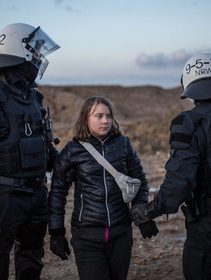
First Lützerath, then Davos: how Greta Thunberg revitalised the climate fight
First the protests in the mud at Lützerath, then a more traditional appearance at Davos. In January, Greta Thunberg brought focus to where it matters most.
Luigi Mastrodonato
Contributor
I'm a freelance journalist, born in 1990. I write about human rights, migration and social issues, perhaps because they're the themes that most inspired me during my studies in Political Science, first in Milan, then in Brussels, with a few months spent studying abroad in Beirut. I always look for the personal stories behind macro-themes, and I believe they're best told through people's own words.
FAVOURITE QUOTE
"I read in self-defence" (Woody Allen)
First the protests in the mud at Lützerath, then a more traditional appearance at Davos. In January, Greta Thunberg brought focus to where it matters most.
On 14th January, thousands of people protested against the expansion of the Lützerath coal mine. And the police detained Greta Thunberg.
The village of Lützerath has been occupied by environmental activists to stop the expansion of a coal mine. Now police are trying to clear them out., but they resist.
The deforestation of the Brazilian Amazon is returning to the abysmal levels of the early 2000s. And it’s not just Bolsonaro’s fault.
The state of women’s rights in Turkey is critical, and gender-based violence is increasing. The country’s withdrawal from the Istanbul Convention will only make matters worse.
The Uyghur population is subject to violent repression at the hands of the Chinese state, with reports of mass sterilisations, re-education camps and forced labour.
Hostilities between Morocco and the Sahrawi people over control of Western Sahara defy a 1991 peace treaty that hasn’t been brought to fruition.
Toxic substances in Kamchatka’s waters have killed 95% of marine fauna and caused health problems for surfers. The causes, however, are still unknown.
President Xi Jinping surprised the international community with China’s pledge to achieve carbon neutrality by 2060. How this will occur is yet to be seen.
The Sudanese government and rebel groups have signed a historic peace agreement, the start of a new chapter for the country after 17 years of civil war.
Dozens of people who fell ill because of toxic fumes and waste from a lead refinery on the outskirts of Mombasa have found justice in court.